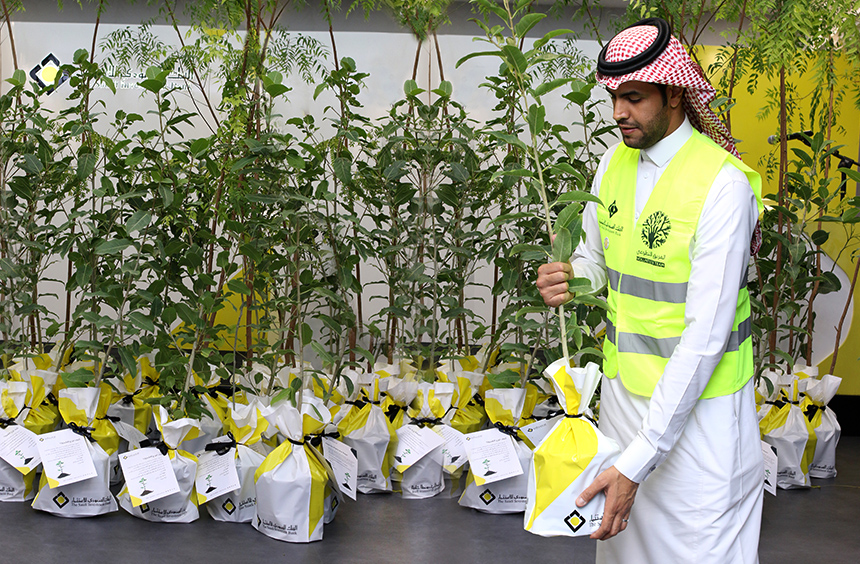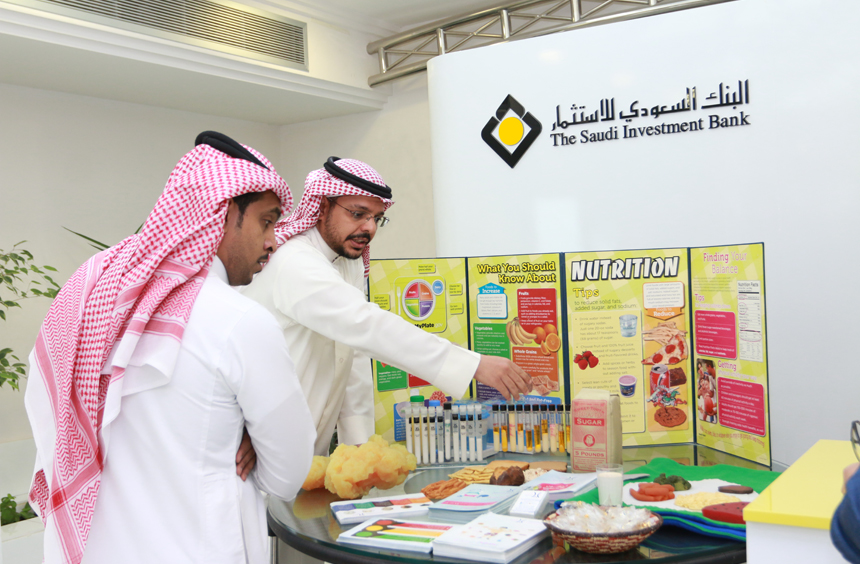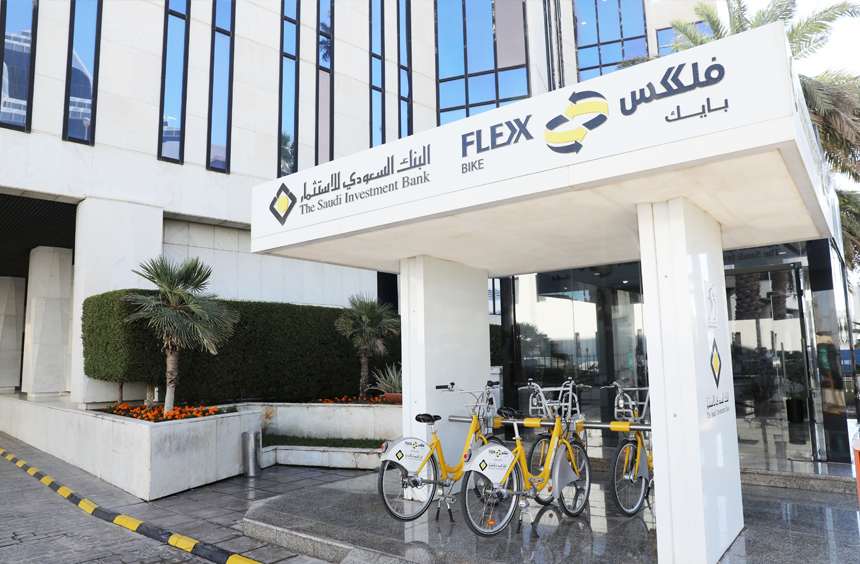Our environmental impact is two-fold; the direct impact through our operations and the indirect impact through our value chain. We fervently believe that our continued long-term value creation depends on conserving natural resources and minimising adverse impact on the environment.
One of our five sustainability pillars is Hifth (environmental protection). Our environmental impact is two-fold; the direct impact through our operations and the indirect impact which occurs through our value chain. Conserving natural resources and minimising adverse impact on the environment contributes to our long-term sustainability. The importance we have given to the environment highlights our commitment to Vision 2030 and the United Nations Sustainable Development Goals.
SAIB has adopted the ISO14000 standard and implemented its Environmental Management System (EMS) based on the standard. The EMS covers the entire gamut of environment-related issues. It includes protecting the environment by minimising and mitigating adverse impact, mitigating the environment’s impact on SAIB, fulfilling compliance obligations, realising financial and operational benefits from environmentally sound alternatives, and communicating environment-related information. Environmental risks and opportunities need to be prioritised for the EMS to be implemented.
We have also developed a Standard Accounting and Operating Procedure (SAOP), to provide a framework for environmental management. The SOAP facilitates implementation of the EMS through the following:
We also make our contribution to the wider issue of combating global climate change. Our commitment to this is underlined by our being a signatory to the United Nations Global Compact and our Communication on Progress (COP) submission. The Bank’s COP met all the requirements to qualify the Bank for the Global Compact Active level.
During the formulation of the Strategic Plan (2014 – 2019), the goal was set of having at least 10% of SAIB’s loan portfolio for financing of environmentally-friendly, low carbon activities like solar energy, wind farms and such other non-conventional energy sources, bio-mass and bio-degradable products, waste and hazardous material recycling projects, energy efficient buildings and construction projects, financing for energy efficient devices related to heating and cooling, home electronics and hybrid/electric cars.
In case of individual lending it would include active support for lending, for installation of solar pumps, solar water heaters, and roof-top solar electricity generation initiatives. In 2018, we achieved 2.28%, but we will strive to achieve the original target in 2019.
The EMS lays down the responsibilities of Executive Management, Middle Management and various functional departments. The Executive Management bears overall responsibility for endorsing the EMS and conducting advocacy for the EMS throughout the organisation; appointing a person with overall responsibility for the EMS; and providing the necessary resources and conducting reviews. Middle management bears the main responsibility for implementation and compliance. The HR Department also plays a key role by identifying the needed competencies and training needs and delivering the necessary training. It is also responsible for incorporating environmental considerations into performance appraisal and reward systems.
The Finance Department contributes by tracking data on environmental management costs and conducting environmental feasibility studies regarding environmental initiatives. The Procurement Department is responsible for aligning purchases with SAIB's environmental policy, identifying requirements for suppliers and criteria for procurement, and monitoring suppliers’ environmental performance.
The Administration Department plays a broad role in implementation of the EMS including:
The specific environmental initiatives include monitoring and reducing energy use, greenhouse gas emissions, paper and water consumption; reducing waste production and recycling; investing in energy conserving technologies; and incorporating environmental considerations into all aspects of building construction and management. Our Building Management System has shown a reduction in water and electricity consumption which reflects a positive environmental impact. Five-year paper consumption and recycling and water expenditure are shown below:
SAIB strives to minimise the environmental impact of its operations. Our direct impact comes mainly from energy usage in our service facilities, usage in our technical infrastructure and fuel consumption incurred in inter-branch travelling. The environmental impact of these activities can be quantified by emissions of CO2 generated by the electricity and fuel consumption.
| 2018 | 2017 | 2016 | 2015 | |
| Direct GHG emissions from fuel usage (scope 1) | 255 | 257 | 264 | 223 |
| Indirect GHG emssions from electricity usage (scope 2) | 18,481 | 20,673 | 21,936 | 25,251 |


Recycling of paper has shown a remarkable increase from 2017 to 2018 due to increase of staff awareness campaigns and activities to promote recycling.
| Year | Consumption
(liters) |
Expenditure
(SAR ’000) |
| 2018 | Not captured | 489 |
| 2017 | Not captured | 580 |
| 2016 | Not captured | 174 |
| 2015 | Not captured | 293 |
| 2014 | Not captured | 112 |
Another of SAIBs sustainability pillars is Awn (helping others). It is part of our ethos that we have a social responsibility to help the community grow and prosper and extend a helping hand to the disadvantaged. We also believe that this will enhance our long-term sustainability. Beyond this, our sustainability strategy includes influencing all stakeholders to adopt practices that will benefit the economy, society, and the nation. The Bank’s efforts in the area of social responsibility were recognised by it being awarded the 2018 Arabia CSR Network Award; the award recognises the Bank’s consistent adherence to responsible practices and its leadership in this field. Our social programmes have been concentrated on certain areas such as literacy programmes, agriculture, health and charity programmes. Our staff, including female staff, participate enthusiastically in our social programmes. In 2018, 29% of SAIB volunteers were women. The volunteers contributed to about 20 community activities in 2018. Details of staff volunteering are given below:

Four blood donation programmes were conducted in 2018 with 85,700 mml of blood donated by over 190 staff. An awareness programme was conducted for staff to educate them on the dangers of obesity and its impact on cancer. Individual consultations were also provided to staff. An internal awareness programme was also conducted about Alzheimer’s disease. A larger programme was conducted to educate the general public on the disease. This included sharing awareness materials on SAIB’s social media accounts, branch screens, and ATM screens throughout the Kingdom.
A permanent clothes donation /recycling box was launched in the Head Office, where over 600kg of clothes were donated to 300 beneficiaries including widows, divorced women and orphans. Ramadan vouchers and winter kits were provided to needy families through charity associations.
Some other community service events and activities held included a programme for supporting productive families, diabetes day activities for children with diabetes and donations to sustainable charitable causes.
Staff was encouraged by internal communications to recycle paper, plastics, electronics, and clothing.
The WooW programme has been an innovation combining banking with charity. It is also a fusion of banking with our religious and cultural values. Under this programme customers are awarded points for certain types of transactions. The points are redeemable for numerous gifts and options; however, customers have also the option of donating their points to charitable causes. Points donated to charities are handled through the WooW Alkhair programme. A total of SAR 504,935 was donated through the programme this year to 45 participating organisations.

The UNGC is an initiative which organisations form voluntary affiliation with to demonstrate their commitment to responsible behaviour in the areas of human rights, labour, environment, and anti-corruption. The foundation of corporate sustainability is a company’s value system and a principles based way of doing business. SAIB has just renewed its Communication on Progress (COP) with the UNGC for the next 12 months; this also aligns with our commitment to the SDGs and the goals of Saudi Arabia’s Vision 2030.
The UNGC encompasses 10 principles which span the four areas mentioned above. The Ten Principles are derived from: the Universal Declaration of Human Rights, the International Labour Organization’s Declaration on Fundamental Principles and Rights at Work, and the Rio Declaration on Environment and Development. By incorporating the Ten Principles of the UNGC into their strategies, policies, and procedures and establishing a culture of socially and environmentally conscious behaviour companies uphold their responsibilities to society and the planet. In the process, they ensure their long-term success, including financial success.
“Flexx Bike” is a programme initiated to combine promoting health and fitness with environmental consciousness. It seeks to promote cycling in public spaces. Individuals can rent a bike from a “Flexx Bike” station and return it for a moderate fee. The environmental factor has been brought in by having “Flexx Bike” stations solar powered.
At the Al Junadriah Festival, 15 bicycles were provided for visitors to use them for transportation inside the festival. SAIB also partnered with KFU and the Saudi Cycling Federation in hosting the second Bike Marathon in Al Hassa. SAIB’s co-sponsorship of the event was used in promoting “Flexx Bike”.

| GRI 103-1, 103-2, 103-3; 203-1, 203-2; 301-2; 302-1, 302-4; 303-1 305-1, 305-2; 306-2; 403-2; 413-1 |